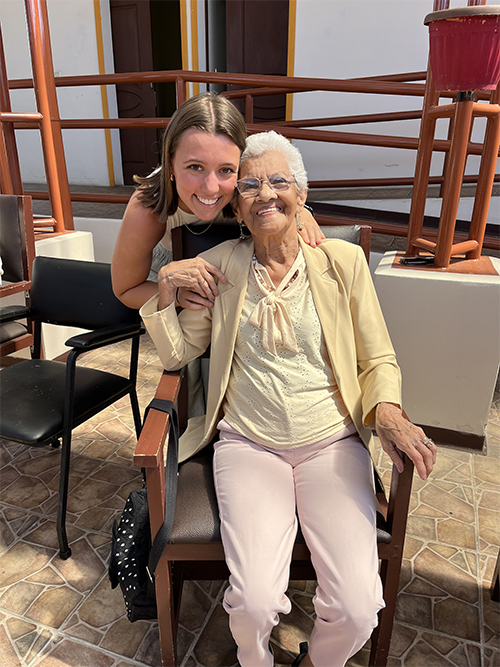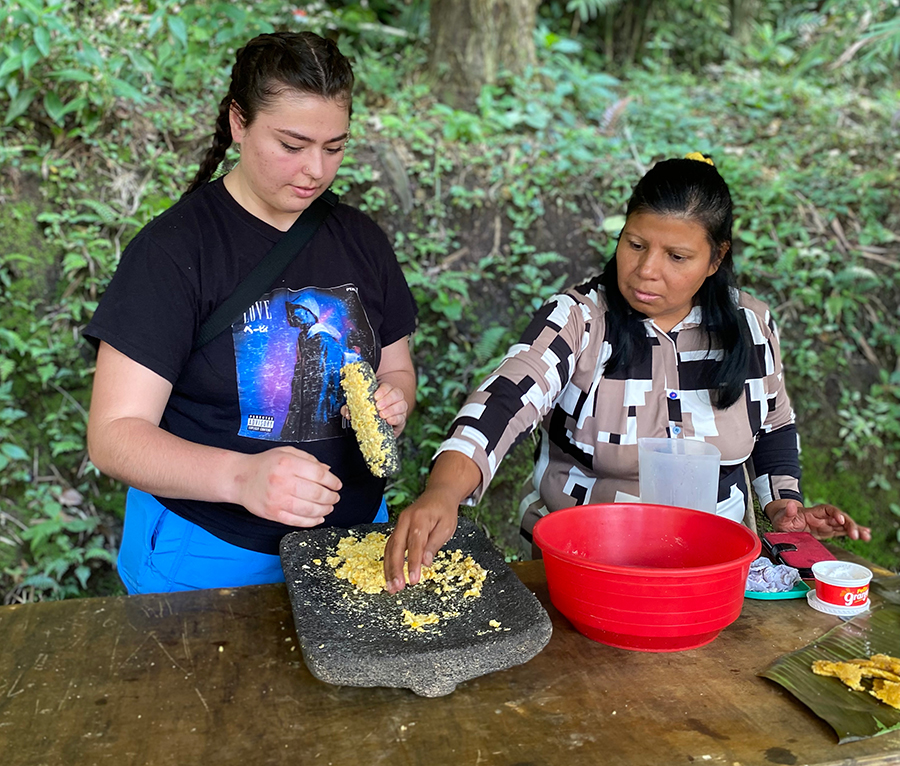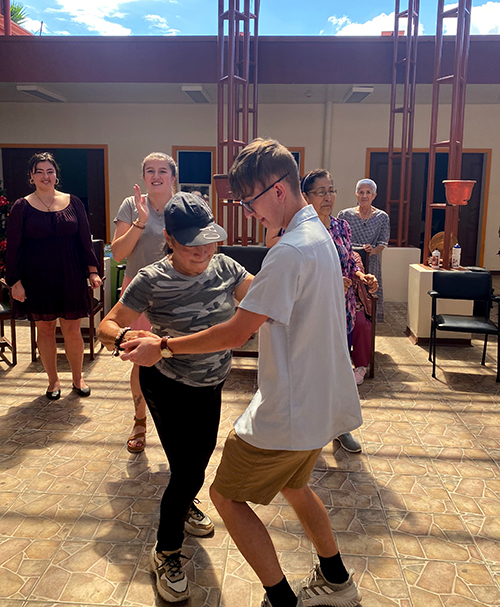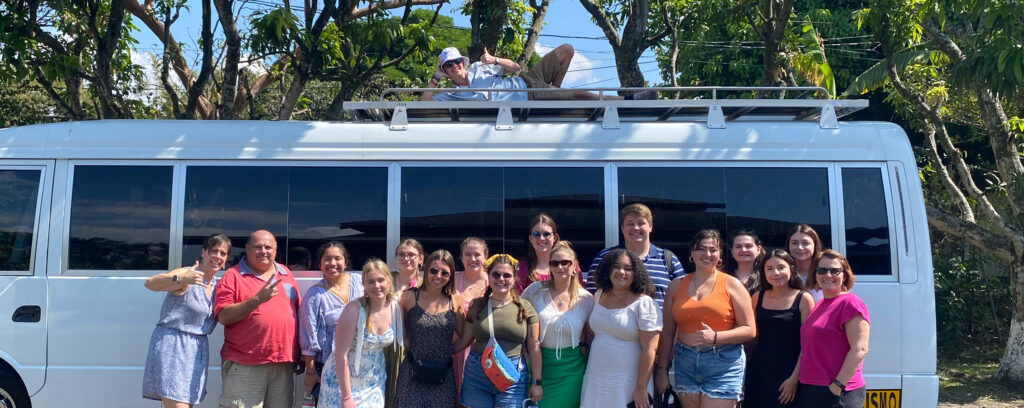Danijela Gallo found the affirmation she was looking for. Montana Petersen found new perspectives on the pace of life. Billy Williams found an experience he describes as “home.”
The three University of Wisconsin-Whitewater students were part of a 12-day faculty-led travel study class for students interested in health and aging. The course, held in Atenas, Costa Rica, immerses students in Spanish while giving them an opportunity to visit one of the world’s “Blue Zones” — five regions of the planet known and studied for human longevity.
“I had the privilege of meeting a remarkable 90-year-old woman named Lourdes, who was still actively riding horses, dancing and cherishing moments with her family,” said Gallo, who is studying to become a speech language pathologist. Gallo, who comes from Greendale, said the experience affirmed her recent decision to take on Spanish as a second major.

“I recognize the potential to work with bilingual students in the future (as a speech language pathologist),” she said. “The warmth and kindness of the people in Costa Rica left a lasting impression especially because of their enthusiasm for my efforts to learn Spanish.”
Pictured: UW-Whitewater’s Danijela Gallo, left, and her friend Lourdes, who gave her insights into food, family, exercise and happiness as keys to a long and happy life. (Photo courtesy Danijela Gallo)
A passion for hands-on experience
Jodie Parys, a professor of world languages and cultures and a certified medical interpreter and translator who teaches a course in medical Spanish for health professionals, began creating the course as a “passion project” about eight years ago.
The course is cross-listed for Spanish, social work and public health students at the university.
“I always wanted to have an experiential piece of the course where students could go to learn about health care systems elsewhere in the world,” said Parys.
During a sabbatical in 2020, Parys established a connection with ARCOS Learning Abroad and traveled to Costa Rica, where her vision became a reality. An ARCOS director onsite in Atenas works with Parys to arrange the activities she selects for her students.
Back in Whitewater, Parys also connected with colleague Jeannine Rowe, a gerontologist and professor of social work whom she knew from her work with the office of Community Based Learning. With Rowe, who was eager to join Parys, the picture became complete.
UW-Whitewater students in Costa Rica
In 2022, 18 students were ready to go for the first class when a surge in the Omicron variant of COVID-19 deferred the trip. Several of those students signed up again the following year, and the course was launched in January of 2023. Gallo, Petersen and Williams were part of another group of 15 who went to Nicoya in 2024.
Students boarded with host families and spoke only Spanish for the length of their visit. Their days were active as they learned about health as a broad concept encompassing the mental, physical and spiritual.
A highlight for the students was their visit to the Nicoya Peninsula Blue Zone. There, the students visited an organic coffee plantation, learned about other organic farming practices and cooked and ate an eight-course lunch alongside residents. They were told about native plants and efforts to preserve heirloom seeds.
Parys said many of the older Costa Ricans arrived on bicycles to meet the students. One man was a 98-year-old farmer who had a message Parys related as, “If I stop moving, I die. This (farming) brings me joy.”
Gallo asked her friend Lourdes for the recipe to longevity.
“She attributed her prolonged and joyful life to her large family of 16 children and 14 grandchildren,” said Gallo. “And her passion for horses, a diet rich in natural foods, and a deliberate avoidance of stress.”
Gallo’s classmate Montana Petersen has been president of Latinos Unidos, a Precollege Program intern, and the undergraduate coordinator in the King-Chávez Scholars Program. She is back on campus living the involved student lifestyle but with some coping skills from Costa Rica.

“Something that stood out to me was the general health and longevity of the elders in Costa Rica,” Petersen said. “Prioritizing movement and community is proven to increase the length and quality of life.
“Brianda (Salinas) and I went out dancing with our host family,” she added, referring to social work major Brianda Salinas, who also participated in the travel-study. “We were the youngest people at the venue, and it was very cool to see how the entire room was moving.”
A measurable impact
During moments when students gathered for class discussions, Parys saw the impact on the students in the experiences they shared, sometimes with tears.
“We were blessed with an amazing group of students,” she said. “They were just open-hearted students. Everyone was in tears. They said there was more of a sense of belonging than they had ever felt.”

The students also were shown Costa Rica’s national health care system, which includes comprehensive care funded through payroll deductions, much like Social Security in the U.S., and a privatized system in place for specialized care.
“I was fascinated by this dual system and thought it would be a great case study,” said Parys.
Billy Williams, a psychology student working on a pre-medical certificate, knew Parys from taking her classes. A junior, Williams was feeling his opportunities were running out to be able to go on a travel-study. So he jumped at the chance to take the course.
“The medical aspect of the travel-study was very interesting to me,” Williams said. “There are so many different ways they approach health care. Not all communities there approach it in the same way. We saw an indigenous community who does more traditional medicine and spiritual practices, and that was very interesting. We learned a lot about how their health insurance works and how it differs from ours.
“We struggle to fully support a lot of communities,” he said. “It was really, really fascinating to see that almost everyone there has that kind of support and access. And figuring out how that’s made possible was really cool.”
Williams’ hosts were Flory, a homemaker and “sobadora” who knows therapeutic massage and Gilbert, a carpenter. Their son Andre lives in the home, and their grown daughter Noelia came by every morning on visits Williams will not forget.
“Noelia would stop by every morning on her way to work to see her mom, give her a kiss and wish her a great day,” said Williams. “Their sense of family is one of their cultural traits that I really love. You can feel it as well as see it.”
Williams one day hopes to serve a Spanish-speaking community as a physician.
“It really helped me connect with that side of me and feel that this is where I belong,” he said. “This was truly life-changing for me because it made me feel a way I had never felt before.”
Pictured: Billy Williams, right, learns to dance as some of his classmates look on during the Costa Rica travel-study. Williams would like to work as a physician serving in a Spanish-speaking community. (Photo courtesy Jodie Parys)
Written by Craig Schreiner | Photos submitted
Link to original story: https://www.uww.edu/news/archive/2024-03-costa-rica-travel-study

